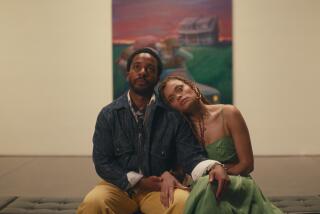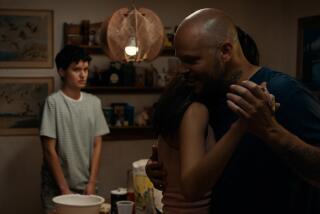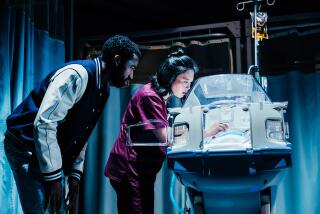Instant father, imminent drama
- Share via
Think of “The Return” as total cinema, the whole package. While most films are fortunate if they succeed on any level, “The Return” works easily on several, making as powerful a mark emotionally as it does visually and even allegorically. Yet the film so catches you up in its compelling story, you’re almost not aware of how masterful a piece of cinema you’re watching.
The unheralded winner of the Golden Lion at the Venice film festival, “The Return” is the feature directing debut of Russia’s Andrey Zvyagintsev, a 40-year-old former actor. Suffused in brooding, intensely Slavic moodiness, it is in part a throwback to the beautifully made Soviet-era art cinema of Andrei Tarkovsky (“Andrei Roublev,” “Solaris”), Aleksandr Sokurov and others.
Luminously photographed by Mikhail Kritchman, “The Return” is certainly as beautiful as any art film, and because all of its physical details are carefully chosen, it has the feel of a biblical parable thrown into the mix. The film combines a subdued but vivid palette with a classically Russian feeling for nature and an impeccable eye for camera placement that is more effective because of how casually it is employed.
But while art films can be diffuse and hard to grasp, “The Return” is the opposite. An examination of the complex, frustrating, unavoidable bonds between fathers and sons, the film goes to a deeper, more profoundly emotional place than its surface gifts would necessarily predict. The pace may be deliberate, even elliptical, but the conclusion is devastating.
Perhaps because Zvyagintsev is a former actor, he has drawn formidable performances out of the two young people who play the film’s sons. Vladimir Garin as older brother Andrey and Ivan Dobronravov as younger sibling Ivan not only create a convincing on-screen familial bond, their ability and willingness to get down to raw emotions makes their work as real as it can get. (Garin, tragically, died in a swimming accident last year.)
“The Return’s” opening scenes, essentially a prelude, introduce the brothers and a world that revolves around their mother (Natalia Vdovina), their friends and each other. With a few short scenes Zvyagintsev, working from a script by Vladimir Moiseenko and Alexander Novototsky, reminds us how desperate being a child can make you feel, creating a despairing, unforgiving mood that eventually characterizes the entire film.
Then, suddenly, the boys’ world turns upside down. After an unexplained absence of some 12 years -- so long that they have to look at an old photo to be sure it’s him -- their father (Konstantin Lavronenko) reappears without so much as a word as to why he left, where he’s been or why he’s returned. (The boys’ first glimpse of him, laid out asleep like Italian artist Andrea Mantegna’s vision of the dead Christ, is typical of the subtle, artful way the film works in its references.)
The brothers are understandably thunderstruck by this return, and they are equally wide-eyed when the father announces, with their mother’s approval, that he’s going to take them on a trip starting the very next day. The boys immediately assume the purpose is camping and fishing, and though the father allows them to feel that way, it’s soon apparent that something else is involved. But what?
“The Return” is especially effective at deliberately creating a sense of mystery about that trip, which the father eventually tells the boys involves getting somewhere for business. Though we get inklings, we’re never quite sure what the father is doing or why he’s doing it. What exactly is his business? Why does he want the boys to come along? His actions and intentions continue to baffle as the boys try to puzzle out who this new person in their life is and what he’s all about.
Making the situation even more unnerving is the physical and psychological bleakness of the post-Soviet Russia the trio travels through. These desolate but beautiful surroundings, where anything could happen, are dreamy in an uneasy way, the kind of locale where a waking nightmare could bloom before anyone realized its destructive potential.
As involving as all this is, it’s only the backdrop to “The Return’s” main dramatic action, the interaction between these boys and the individual they take on faith is their father. This man turns out to be an unbending disciplinarian with very definite ideas of how they should behave, someone who alternates uncertain attempts at camaraderie with a fierce determination to make sure they can do things on their own.
The boys, from whose point of view we largely see the trip unfolding, respond to this in the time-honored opposing ways all children choose from. The older son, eager for the kind of connection you can only have with a parent, is willing to do whatever it takes to have his father love him. The younger Ivan, however, is a different story.
“As stubborn as a mule” in his brother’s words, Ivan, who his father begins to call “Shorty,” is as willful as he is small. Resentful at the father’s long absence, with profound suspicion written on his youthful face, Ivan chooses resistance, preferring to chafe at restraints and challenge authority than acknowledge that he too may want a father.
In fact, one of the ways to look at “The Return’s” father and sons is to see everyone trying on roles. While the father can be seen as attempting to play catch-up as a parent, squeezing all the lessons he should have given over years into a few days, the brothers are struggling with the role of sons, trying to see if they can fit into that position after years of accepting fatherlessness as a given.
Though “The Return” is effective on any number of fronts, including religious allegory, it’s as an intense family drama that it has the most impact. Benefiting from a sense of sureness and command of material that is remarkable for a debuting director, it looks on as the characters discover, all at once, what it means on the most profound level to be a father, to be a son. No matter how hard you fight those bonds, they are there. Russians from Turgenev to now have been compelled by this subject, and director Zvyagintsev, whose own father disappeared from his life when he was 6, succeeds in making it impressively his own.
*
‘The Return’
MPAA rating: Unrated
Times guidelines: Extremely intense emotional situations unsuitable for children
Ivan Dobronravov...Ivan
Vladimir Garin...Andrey
Konstantin Lavronenko...Father
Natalia Vdovina...Mother
Released by Kino International. Director Andrey Zvyagintsev. Producer Dimitry Lesnevsky. Executive producer Elena Kovaleva. Screenplay Vladimir Moiseenko, Alexander Novotsky. Cinematography Mikhail Kritchman. Editor Vladimir Mogilevsky. Costumes Anna Barthuly. Music Andrey Dergatchev. Art director Janna Pakhomova. Running time: 1 hour, 46 minutes.
In limited release.
More to Read
Only good movies
Get the Indie Focus newsletter, Mark Olsen's weekly guide to the world of cinema.
You may occasionally receive promotional content from the Los Angeles Times.











